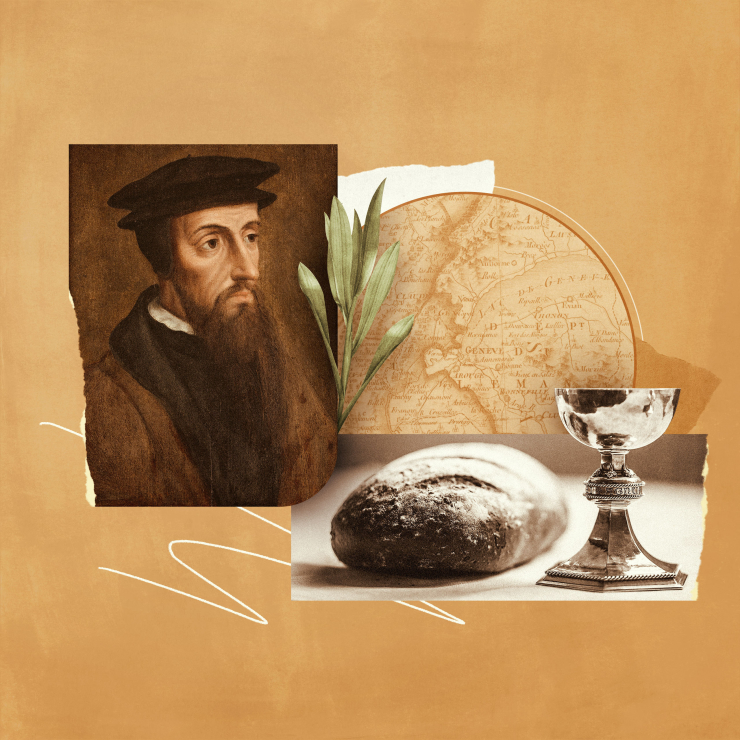5 Things You Should Know about John Calvin

1. John Calvin was ousted from his church, ministry, and home.
Less than two years after beginning his ministry in Geneva, a twenty-nine-year-old John Calvin (1509–64) found himself ousted from his church, ministry, and home, with two days’ notice to quit the city. No doubt as he and William Farel traveled away from Geneva that April, they wondered what would come next. Their thoughts were on a looming ecclesiastical battle in response to this bitter experience; they were planning how they could persuade Zurich and Bern to work to reinstate them in Geneva. Yet, unknown to Calvin, the Lord in His providence would thwart their attempts. Instead, He was arranging a season of pastoral training that would prove foundational for Calvin’s future pastoral labors.
2. John Calvin experienced ministry failures.
While those who have some familiarity with Calvin’s life story know of his early efforts in Geneva to implement a faithful observance of the Lord’s Supper through church discipline, fewer know the story of how the Lord changed Calvin through this failure. Once in exile, Calvin initially settled in Basel, but then was invited to come to Strasbourg by Martin Bucer (1491–1551). Bucer, who was almost twenty years older than Calvin, not only opened up ministerial opportunity in the city, but also warmly befriended Calvin, welcoming him into his home, and in time assisting with the purchase of a neighboring home for Calvin. This was despite the fact that the year before, Calvin had written him a confrontational and arrogant letter—which Bucer had met with a patient, loving response. In Bucer, Calvin met the mentor and pastor he needed.
3. John Calvin served as pastor to refugees.
The year that Calvin arrived in Geneva (1538) was also the year that Bucer was completing the manuscript of his “little book,” Concerning the True Care of Souls.1 No doubt in their mealtime conversations, the two spoke extensively about pastoral ministry and the life of the church. Bucer had long experienced obstacles in ministry in Strasbourg, and his writing was part of his patient effort to bring Christ-centered growth to the church and her ministry. In God’s kind providence, Calvin’s opportunity for ministry in the city went beyond teaching; he served as the pastor of the French refugee congregation. While there were many encouragements in the work, Calvin also experienced sorrows. His close friend and cousin, Pierre Robert Olivétan, who had been instrumental in his conversion, died. An old friend from France, Louis du Tillet, who had sheltered him from persecution and provided resources for the first draft of The Institutes of the Christian Religion, returned to Roman Catholicism. A new joy came through his marriage in 1540 to Idelette de Bure, “the best companion in my life.”
4. John Calvin willingly returned to the church that ousted him.
The same year of Calvin’s marriage, in the midst of the new work in Strasbourg, a time he called “the happiest years of my life,” a most unexpected call came. Geneva wanted him to come back and serve as pastor again. He hesitated, stating “there is no place under heaven I am more afraid of . . . I would rather submit to a hundred other deaths, than to that cross on which I would have to perish a thousand times every day.” Yet, it was not only Geneva that had changed—Calvin had as well in these few short years. With Bucer’s encouragement, and his own trepidation, Calvin yielded to the call. In some respects, the city had changed and was more welcoming to a Reformation direction in the church and community. In other ways, it was the same. It would take fourteen long years of ministry before the issue of the faithful administration of the Lord’s Supper would be resolved. While he continued to grieve the weaknesses of the church, Calvin, in part due to the Lord’s instrumental use of Bucer’s ministry in his life, had a much longer vision and a more patient love for the church.
5. Through joys and trials, John Calvin looked for God’s providences.
Nine years later, well into his renewed ministry in Geneva and just months after burying his dear wife, Calvin taught on Paul’s words to the Thessalonians: “Paul does not ascribe merely the beginning of our salvation to the grace of God . . . the whole progress of our salvation is nothing but the grace of God.” Through joys and trials, he had learned more profoundly that behind both pleasant days and what seem frowning providences is the smiling face of the Savior who continues to shape us for service and glory.
This article is part of the 5 Things You Should Know collection.
- Martin Bucer, Concerning the True Care of Souls, trans. Peter Beale (Carlisle, PA: Banner of Truth, 2009), 1-218.↩